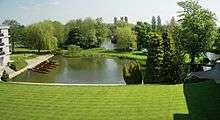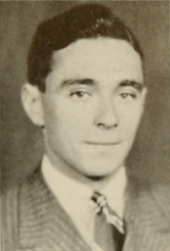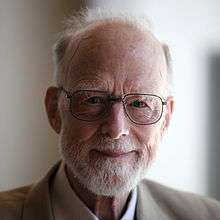Wolfson College, Oxford
| Wolfson College | ||||||||||||||||||
|---|---|---|---|---|---|---|---|---|---|---|---|---|---|---|---|---|---|---|
 | ||||||||||||||||||
|
Blazon: Per pale gules and or on a chevron between three roses and two pears all countercharged the roses barbed and seeded proper. | ||||||||||||||||||
|
| ||||||||||||||||||
| University | University of Oxford | |||||||||||||||||
| Location | Linton Road, Oxford | |||||||||||||||||
| Motto | "Humani nil alienum" (Homo sum, humani nil alienum a me puto)[1] | |||||||||||||||||
| Established | 1965 | |||||||||||||||||
| Named for | Sir Isaac Wolfson | |||||||||||||||||
| Previous names | Iffley College | |||||||||||||||||
| Sister college | Darwin College, Cambridge | |||||||||||||||||
| President | Dame Hermione Lee | |||||||||||||||||
| Undergraduates | none (graduate-only college) | |||||||||||||||||
| Postgraduates | 614 (2008) | |||||||||||||||||
| Website |
www | |||||||||||||||||
| Boat club | Boatclub | |||||||||||||||||
Wolfson College /ˈwʊlfsən/ is a constituent college of the University of Oxford in England. Located in north Oxford along the River Cherwell, Wolfson is an all-graduate college with over sixty governing body fellows, in addition to both research and junior research fellows. It caters to a wide range of subjects, from the humanities to the social and natural sciences. The college is also Oxford University's most international and interdisciplinary graduate college, with students from 75 nationalities enrolled in masters and doctoral programs.[2]
The liberal philosopher Sir Isaiah Berlin was the college's first president, and was instrumental not only in its founding in 1965, but establishing its tradition of academic excellence and egalitarianism. The college houses The Isaiah Berlin Literary Trust and the annual Isaiah Berlin Lecture. The current president of Wolfson College is Dame Hermione Lee, to be succeeded in Summer 2018 by Tim Hitchens[3].
As of 2006, the college had a financial endowment of £33.5 million.[4]
History
Wolfson's first president Sir Isaiah Berlin, the influential political philosopher and historian of ideas, was instrumental in the college's founding in 1965.
The college began its existence with the name Iffley College, which offered a new community for graduate students at Oxford, particularly in natural and social sciences. Twelve other colleges of the university provided grants to make the establishment of Iffley possible. As of 1965, the college had neither a president nor a building. Berlin set out to change this, eventually securing support from the Wolfson Foundation and Ford Foundation in 1966 to establish a separate site for the college, which included 'Cherwell', the former residence of J.S. Haldane and his family, as well as new buildings built around it. Isaac Wolfson generously contributed to the foundation of the college. In recognition of his contribution the college's name was changed to Wolfson College.
But Berlin's work as the president of the college was far from over. Formally taking over the reins of the college in 1967, he envisioned Wolfson to be a centre of academic excellence but, unlike many other colleges at Oxford, also bound it to a strong egalitarian and democratic ethos.[5] In Berlin's words, the college would be 'new, untrammelled and unpyramided'.[5]
If Berlin was the inspiration and beacon for this most modern of academic institutions, its birth and early shape would not have happened without the tireless backroom work of Berlin's Vice President, Michael Brock, formerly of Corpus Christi College. They were a formidable team and ensured Berlin's ideals were largely achieved. Wolfson is perhaps the most egalitarian college at Oxford, with few barriers between students and fellows. There is no high table, only one common room for all the members of the college, and gowns are worn only on special occasions. Graduate students serve on the college's governing body and participate in General Meetings. Berlin's reputation and presence in the early years also helped shape the intellectual character of the college, attracting many distinguished fellows like Niko Tinbergen, who won a Nobel Prize for his studies in animal behavior in 1973. Berlin's own prominence in the humanities helped attract many graduate students like Henry Hardy, interested in political philosophy and the history of ideas.[5]
Buildings and grounds


The college owns land on both sides of the River Cherwell and has a private footbridge bridge across the river. It has one of the most modern buildings of all the Oxford colleges. The construction of the main building of the college was completed in 1974. It was designed by the Powell and Moya Architects. The college's main building has three quadrangles: the central quadrangle named the Berlin Quad after Isaiah Berlin, as well as the Tree Quad built around established trees, and the River Quad into which the Cherwell has been diverted to form a punt harbour. One of the distinctive features of the grounds is the preservation of mature trees around and within the buildings. The main buildings and bridge were grade II listed in June 2011.[6]
The college has student accommodation in the main college building, in three child-friendly courtyards surrounded by family housing, and also has similar accommodation in a scattering of purpose-built blocks, including the Robin Gandy Buildings, and in existing houses on Linton Road, Chadlington Road and Garford Road. The college also owns the adjacent house and orchard which is currently occupied by the Bishop of Oxford.
Library
The college library, which occupies both the floors of one wing of the college's main building, is open to members of the college. The main library is on the first floor, approachable from the side of the dining hall and the lodge, and two other collections, called the Floersheimer Room and the Hornik Memorial Room are on the ground floor. A mezzanine floor in the main library has books as well as carrels for individual use of graduate students of the college. The library has already emerged as an extensive collection of books and journals.
Common room and hall

The college has one common room for fellows and graduate students. The common room has two floors: the upper common room, with an attached terrace overlooking the punting harbour, which has a bar and a coffee counter, and the lower common room, which has magazines and newspapers. The college's hall is one of the few in the university to have common table. The 'Haldane Room', a hall adjacent to the dining hall proper, is where formal meals, especially the convocation lunch, are held.
Gardens
The college owns grounds on both sides of the river, including two meadows on the opposite side, towards Marston. It has a small but well maintained garden behind its main building, and beside the river. The garden is landscaped well on the river-bank, with a flight of steps leading up to a green-house and a sundial. The college also has a smaller garden beside the Robin Gandy building, which stands on the banks of the river.
Sports and punting harbour

The college has its own squash court and croquet lawn, and takes part in many university sporting events, including cricket, football, and the yearly rowing competition. It is one of the few in Oxford with its own punting harbour, with a fleet of punts for use by all members of the college . There is a boat club on the ground floor of 'C' Block.
Academic profile
Being a graduate college, it had, as of 2008, 614 students, 454 of whom were DPhil students. The remainder were studying for MPhil, MSc, MSc by Research, MSt, MSt by Research, MBA, EMBA, MLitt, MLitt by Research, BPhil, and Cert degrees. The college does not accept MJur or LLB candidates.
It is home to Oxford's Centre for Korean Studies and the International Association of Tibetan Studies. It was also home to the Centre for Socio-Legal Studies, Oxford,[7] which has now moved to an independent location of the city. The Foundation for Law, Justice and Society, which is affiliated with the College and the Centre for Socio-Legal Studies, has been based at these offices since 2005.[8]
Notable people associated with Wolfson
Wolfson is associated with a number of prominent individuals. These include former students, Fellows of the college and past Presidents. As Wolfson is a graduate-only college, most students will have been associated with another college or institution, before coming to study at Wolfson for a Masters or DPhil degree.
Notable Alumni
In the sciences, alumni of the college include the human geneticist Dame Kay Davies, the astronomer and Caltech professor Richard Ellis and mathematician James R. Norris. Entrepreneurs include Reid Hoffman, the co-founder of LinkedIn.
Notable Fellows
Notable current and former fellows of the college include William Bradshaw, Baron Bradshaw, Member of the House of Lords, Anthony Epstein, discoverer of the Epstein-Barr virus, Steven Schwartz, Vice Chancellor of Macquarie University in Sydney, Australia, and Niko Tinbergen, Dutch ethologist and recipient of the Nobel Prize in Physiology or Medicine.
See also
| Wikimedia Commons has media related to Wolfson College, Oxford. |
- Fellows of Wolfson College, Oxford
- Wolfson College, Cambridge
References
- ↑ (A quote from the Roman playwright Terence: I am a human being and I consider nothing that concerns human beings alien to me)
- ↑ "Oxford's Most Un-Oxfordian College" Oxford Royale Academy
- ↑ http://www.wolfson.ox.ac.uk/news/president-elect
- ↑ "Oxford College Endowment Incomes, 1973-2006". Archived from the original on 2012-05-27. (updated July 2007)
- 1 2 3 Ignatieff, Michael (1998). Isaiah Berlin: A Life. Chatto & Windus. ISBN 0-7011-6325-9.
- ↑ Historic England. "Details from listed building database (1402277)". National Heritage List for England. Retrieved 4 April 2015.
- ↑ "Official website".
- ↑ "Foundation for Law, Justice and Society website".
External links
Coordinates: 51°46′16″N 1°15′19″W / 51.770977°N 1.255263°W
.svg.png)














